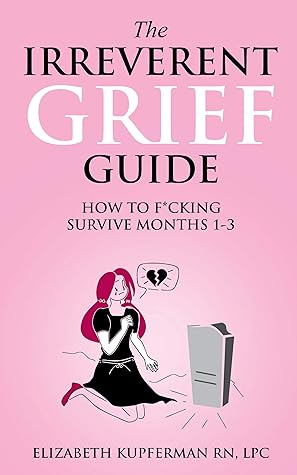More on this book
Community
Kindle Notes & Highlights
Read between
March 3 - March 26, 2025
The beauty of meaning making is that YOU
make the meaning and remember, your meaning may be different than others’ meanings.
Not only do we die how we live, we also grieve how we live.
Grief shows you who your friends really are.
Death on its own is pretty fucking dramatic, so we don’t need that right now.
If you feel like crying, crying is a wonderful thing to do.
In addition, emotional crying can produce endorphins that actually relieve the pain we're suffering.
We do our grief work, or we must live with carried pain.
Crying as a response to sadness is a gift
Another reason you might hold the tears back is that you think that once you start, you will never stop.
I see crying as a signal of strength.
for “Sudden Temporary Upsurge of Grief,”
The important thing to know is that these upsurges are a totally expected and completely normal symptom of grief,
“Disenfranchised grief” is when you have experienced a death or loss, but you can't talk about or share your pain with others, because it is considered unacceptable or taboo.
Suffering in silence because our grief is disenfranchised can lead us to even more pain because we aren’t able to fully express ourselves and suffer in silence and that can lead to other mental health issues.
Bitch, if you feel grief, then it’s your right as a human to grieve. Your grief is fucking valid. It is also your right to be comforted, cared for, affirmed, and validated.
Tell yourself at least once each day as you live through your pain that your love is real and that is
Enfranchise your grief. You are the only one who can when it is invisible to everyone else. It is real and you owe it to yourself to shine the light on it.
Your loss is valid, and your grief is valid.
It's what you do in that time that can heal your wounds. If time has passed and you feel better, it's because you have done something.
That “something” could be crying, gaining perspective, forgiving yourself, giving yourself permission to lose it, to wail, to sit around and do nothing, and/or whatever it is that you need to do because you’re grieving.
Carried grief is when you do not mourn your loss and take the pain with you into everyday of your life.
Remember, grieving is a consequence of loving.
What I mean by temporarily compartmentalizing your grief is essentially that sometimes in our lives in the first year, we are called to step up and must do something really important or vital and we really don’t want our grief to be front of our minds during that time.
If you choose to temporarily compartmentalize your grief for any reason, in exchange for the gift of compartmentalizing, you must give your psyche/grief at least the same or more dedicated time to intentionally grieve.
Compartmentalizing isn’t bad, it’s healthy survival and advanced grief work.
Now you know that no matter what you’re doing from the second you found out about the death, you are grieving.
Dual Process Model
grief oscillates back and forth between loss-focused grief and restoration-focused grief.
Loss-focused grief includes the day-to-day thoughts, feelings, and actions typically associated with grief. Restoration-focused grief are the times when you’re not swallowed up by grief and are living the other parts of your life, not focused on grief.
That means that when you are in a restorative phase, it's still fucking stressful.
Compartmentalizing your grief would fall into the restoration side.
It’s always helpful for me to remember that when I’m on the restoration side, my person that I loved so deeply and have to learn to live without, still has his/her/they’re VIP Membership!!!!!


